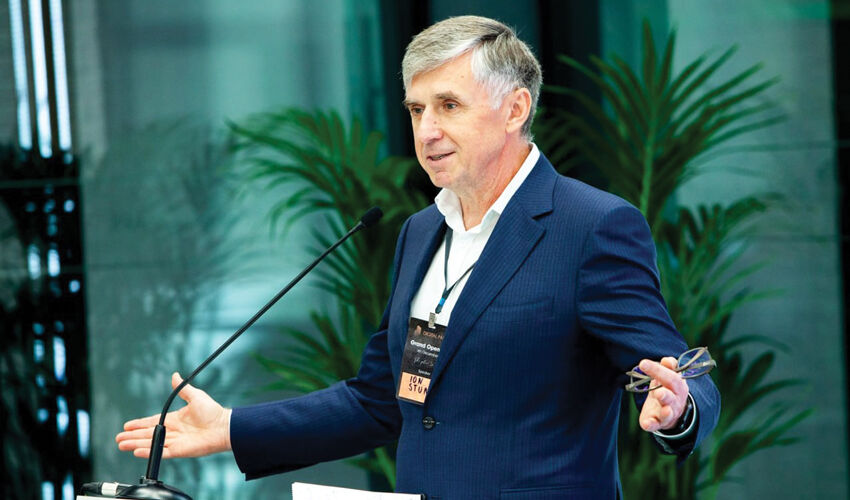
Ion Sturza
In 2021, when negotiations on the new program were just beginning, the IMF noted that the Moldovan authorities had made “commendable progress in rehabilitating the banking sector and strengthening macrofinancial stability,” for which they were “rewarded” with a new 40-month program. The proposed measures in the new program – if properly organized and decisively implemented – were expected to “bring significant benefits in the medium term and unleash Moldova’s untapped economic potential.” But something went wrong.
The Moldovan government confirmed that the IMF tranche was not transferred this year. As a consequence, the draft amendments to this year’s budget reduce external financing by 2,661.3 million lei. “The reduction of receipts on borrowed funds to support the budget is conditioned by the exclusion of the last tranche of 2.9 billion lei due to the completion of the financing program with the IMF,” the Finance Ministry explains.
“Straw” for the budget
Finance Minister Adrian Havrilice assured that the government has prepared all the necessary measures so that the absence of the IMF tranche would not affect the budget stability and the country’s financial discipline.
“The corresponding tranche was not transferred, but we had sufficient sources of financing. If you pay attention to the budget adjustment, we actually have a $300 million reduction in debt servicing costs. Therefore, it was not a problem. During this period, on the one hand, we had funds that should have remained in the reserve. There is a loan from the French side on which we are increasing our borrowing quota in no worse terms. There are also sources of funding under the growth plan with the EU. We have seen that even without IMF tranches, the financing was not in the worst conditions,” Adrian Gavrilitsa said.
Thus, 25 million euros (about 493.8 million lei) are included on the basis of a loan agreement for budgetary support, provided by the French Development Agency. The draft ratification of the 25-million-euro credit line agreement, called “Green Energy Transition Program”, is already on the MPs’ agenda.
Trying to explain the reasons for the premature “curtailment of the program”, the chairman of the parliamentary commission for economy, budget and finance, Radu Marian, said that Moldova “had a transitional period in autumn – elections, when there is some uncertainty, a situation in which one government leaves, another one comes, and priorities change a bit”.
He confirmed that the funds that did not come from the fund were found from other sources, both internal and external, “under similar conditions.”
“Our previous program cycle has come to an end. There were certain policy divergences. The IMF mission should come in December to assess what we managed to realize and what we did not. After all, the IMF provides loans on favorable terms in exchange for measures to be taken by the government, which we agree on. Of course, the government does what it considers important and useful for the people. Sometimes there may be serious differences in approach, sometimes not. In December the mission will come, we will see what has been done, what has not been done, and maybe we will resume negotiations on a new program agreement,” Marian said in one of the programs.
Experts attribute the blocking of the last two IMF tranches to the fact that the government has not fulfilled some of its obligations. In particular, according to economic expert Stas Madan, it is the failure to adopt laws on the abolition of tax exemptions and expansion of the tax base, which should have brought about 900 million lei per year starting from 2026.
“The government was given a deadline of September 30, 2025 to make the relevant legislative changes. Obviously, this was not done, as the election campaign was underway, and such a measure would have been political suicide. A legitimate question arises to the former government: how could it have been possible to make such a ‘brilliant’ agreement, committing itself to fulfill such an unpopular condition precisely at a time when it was known in advance about the elections?”, – commented Madan on his page in the social network.
This was also confirmed by former Prime Minister Ion Kiku: “What they denied during the election campaign in their statements about the introduction of VAT on online purchases was not mere speculation by the opposition. They made a commitment to do it from January 1, 2026, but because of the election campaign, at least in the public space, we have not seen them approve it – which is a debt,” Kiku said.
Mission impossible?
Radu Marian does not foresee a revision of the main taxes in the near future: “I do not foresee an increase in the main taxes – be it VAT or income tax – in the near future. Our level of public debt is more than reasonable and our budget deficit is in a better position compared to countries in the region.”
However, economist Vladimir Golovatyuc is not so optimistic. In his opinion, 2025 will most likely be able to “pull through” at the expense of existing reserves, but 2026 will be difficult – without new IMF programs and with depleting reserves, it will be difficult for the government to fulfill all its obligations.
“The last tranche of the loan, which will not come from the IMF, will be replaced by the use of accumulated balances on treasury accounts. When loans of over €440 million were received in June and August, some of it was not used but settled in treasury accounts. The volume of balances on these accounts increased from 5.5 billion lei in May to 11.7 billion lei in September. The amendments to the state budget for 2025 stipulate that only 3.3 billion lei will remain in the accounts on December 31. This is almost twice lower than at the beginning of the year – 6.1 billion lei. Taking into account that in January, especially in the first two weeks of the year, there is a complete calm, while expenses, especially for salaries, pensions and various allowances, have to be paid, the decrease in the balance at the end of the year is a serious problem,” Golovatiuc said on social media.
Many scenarios are circulating in the public space – some more gloomy than others: from borrowing on the domestic market to any other sources on any terms and even possible refusal of financing from other partners. Former Prime Minister Vlad Filat called the situation a “domino effect: without the IMF, other external partners will be shaken as well”. Mayor Ion Ceban complained that only fragmentary information is being published in the public space, which confuses rather than clarifies the situation. And this “increases anxiety and even panic in the society”.
Cherchez la femme
The public would like to receive more substantial information from the government, especially from Prime Minister Alexandru Munteanu, including on cooperation with the IMF. This role was assumed by former Prime Minister Ion Sturza. He presented the “real” reason that led to the suspension of financing. And it boils down to banal “squabbles”.
“It is about the personal grudge of some IMF staff who failed to impose certain decisions on the country’s leadership, which I consider an interference in internal affairs. Concrete examples are the change of the leadership of the National Bank of Moldova, inherited from Plahotniuc, and the appointment of members of the NBM Administrative Council according to political criteria. Plus some legislative changes that would limit the independence of the National Bank. The IMF is categorically against it. The change of Mrs. Veronica Dragalin (who lives in the USA – ed.) from the post of the head of the Anti-Corruption Prosecutor’s Office and the stopping of the promised reform – lack of logistical support, building, personnel. This prosecutor is known to be friendly with the local IMF staff. We can say, “Americans with Americans”,” Ion Sturza wrote, calling it a personal version.
Expert Veaceslav Ionitsa also points to this: “One of the important reasons why the IMF blocked the two tranches – and there is practically no chance of resuming negotiations in December – is related to the situation with the Anti-Corruption Prosecutor’s Office. Instead of strengthening this institution, the authorities use manipulations like PACO, seek to subjugate it politically and did everything possible to make its head, Mrs. Veronika Dragalin, resign. The result: instead of strengthening anti-corruption mechanisms, we are finally weakening them”.
Moldovan metamorphoses
Against this background, Moldovan society underwent an unexpected metamorphosis – the majority of commentators and opposition politicians took the side of the IMF. Famous figures loyal to the authorities, on the contrary, began to openly and boldly criticize the IMF policy. As sociologist Doru Petruti noted, “those who before the elections were “noodling” people are now trying to explain how bad and useless the IMF is, and that it would be better to do without it”.
Now Ion Sturza has “burst”: “Now that the occasion has arisen, I cannot miss the opportunity to express all my personal frustrations and doubts about the IMF and, indirectly, other international institutions that keep us under constant financial and political control – sometimes subtle, sometimes blatant. Officially, the IMF’s mission is to promote economic and financial stability in the world by supporting member countries in maintaining macroeconomic balance and developing sustainable economies. The wording is impeccable, no doubt. But there is often a gaping chasm between wording and reality: harsh conditionality, imposed reforms, fiscal austerity, and a growing dependence on loans that often keep small countries in a vicious cycle of “perpetual aid.”
Today, the European Commission calls Moldova “the best student in the class.” Apparently, it is this status that gives the authorities the courage to “dare” the IMF. Well, the main thing is not to disappoint the teachers. And remember that they sometimes change.

